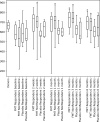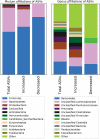Engraftment of strictly anaerobic oxygen-sensitive bacteria in irritable bowel syndrome patients following fecal microbiota transplantation does not improve symptoms
- PMID: 34074214
- PMCID: PMC8183560
- DOI: 10.1080/19490976.2021.1927635
Engraftment of strictly anaerobic oxygen-sensitive bacteria in irritable bowel syndrome patients following fecal microbiota transplantation does not improve symptoms
Abstract
Dysbiosis of the gut microbiome has been correlated with irritable bowel syndrome (IBS). Fecal microbiota transplantation (FMT) is being explored as a therapeutic option. Little is known of the mechanisms of engraftment of microbes following FMT and whether the engraftment of certain microbes correlate with clinical improvement in IBS. Microbiome data, from a previously reported placebo-controlled trial of treatment of IBS with FMT or placebo capsules, were used to investigate microbial engraftment 15 days, 1, 3 and 6 months after treatment through assessment of gains, losses and changes in abundance of amplicon sequence variants (ASVs) and microbial diversity (CHAO-1 richness) between the FMT group and the placebo group. These data were compared to changes in IBS Symptom Severity Scores (IBS-SSS). Twelve days of treatment with 25 daily multi-donor FMT capsules induced significant short- and long-term changes in the recipients' microbiomes for at least 6 months, with persistent engraftment of a variety of anaerobic bacteria from keystone genera, such as Faecalibacterium, Prevotella and Bacteroides and increased microbial diversity, particularly in patients with low initial diversity. FMT recipients lost ASVs after treatment, which was seen to a much lesser extent in the placebo group. No ASVs increased to a greater extent between FMT responders and non-responders following treatment. Major long-term changes, lasting for at least 6 months, in the gut microbiomes of IBS patients are seen following treatment with FMT capsules. None of these changes correlated with clinical improvement. The relationship between the microbiome and the etiology of IBS still remains unsolved.
Keywords: FMT; Fecal microbiota transplantation; amplicon sequence variants; anaerobic bacteria; bowel cleansing; diversity; dysbiosis; engraftment; gut microbiome; irritable bowel syndrome.
Figures





Similar articles
-
Effect of antibiotic pretreatment on bacterial engraftment after Fecal Microbiota Transplant (FMT) in IBS-D.Gut Microbes. 2022 Jan-Dec;14(1):2020067. doi: 10.1080/19490976.2021.2020067. Gut Microbes. 2022. PMID: 35014601 Free PMC article. Clinical Trial.
-
Faecal microbiota transplantation alters gut microbiota in patients with irritable bowel syndrome: results from a randomised, double-blind placebo-controlled study.Gut. 2018 Dec;67(12):2107-2115. doi: 10.1136/gutjnl-2018-316434. Epub 2018 Jul 6. Gut. 2018. PMID: 29980607 Clinical Trial.
-
Effects of fecal microbiota transplantation in subjects with irritable bowel syndrome are mirrored by changes in gut microbiome.Gut Microbes. 2020 Nov 9;12(1):1794263. doi: 10.1080/19490976.2020.1794263. Gut Microbes. 2020. PMID: 32991818 Free PMC article. Clinical Trial.
-
Fecal microbiota transplantation in patients with irritable bowel syndrome: an overview of current studies.J Appl Microbiol. 2023 Mar 1;134(3):lxad044. doi: 10.1093/jambio/lxad044. J Appl Microbiol. 2023. PMID: 36882216 Review.
-
A meta-analysis of randomized controlled trials evaluating the effectiveness of fecal microbiota transplantation for patients with irritable bowel syndrome.BMC Gastroenterol. 2024 Jul 5;24(1):217. doi: 10.1186/s12876-024-03311-x. BMC Gastroenterol. 2024. PMID: 38970007 Free PMC article.
Cited by
-
Fecal Microbiota Transplantation for Disorders of Gut-Brain Interaction: Current Insights, Effectiveness, and Future Perspectives.Curr Gastroenterol Rep. 2025 Jul 9;27(1):50. doi: 10.1007/s11894-025-01001-6. Curr Gastroenterol Rep. 2025. PMID: 40632357 Review.
-
Fecal microbiota transplantation-current perspective on human health.Front Med (Lausanne). 2025 Mar 14;12:1523870. doi: 10.3389/fmed.2025.1523870. eCollection 2025. Front Med (Lausanne). 2025. PMID: 40160324 Free PMC article. Review.
-
Fecal Microbiota Transplantation for Patients With Irritable Bowel Syndrome: A Meta-Analysis of Randomized Controlled Trials.Front Nutr. 2022 May 27;9:890357. doi: 10.3389/fnut.2022.890357. eCollection 2022. Front Nutr. 2022. PMID: 35719141 Free PMC article.
-
Fecal microbiota transplantation for irritable bowel syndrome: a systematic review and meta-analysis of randomized controlled trials.Front Immunol. 2023 May 18;14:1136343. doi: 10.3389/fimmu.2023.1136343. eCollection 2023. Front Immunol. 2023. PMID: 37275867 Free PMC article.
-
Fecal microbiota transplantation influences microbiota without connection to symptom relief in irritable bowel syndrome patients.NPJ Biofilms Microbiomes. 2024 Aug 28;10(1):73. doi: 10.1038/s41522-024-00549-x. NPJ Biofilms Microbiomes. 2024. PMID: 39191760 Free PMC article. Clinical Trial.
References
-
- Sokol H, Jegou S, McQuitty C, Straub M, Leducq V, Landman C, Kirchgesner J, Le Gall G, Bourrier A, Nion-Larmurier I, et al. Specificities of the intestinal microbiota in patients with inflammatory bowel disease and Clostridium difficile infection. Gut Microbes. 2018;9(1):55–60. doi:10.1080/19490976.2017.1361092. PMID:PMC5914915. - DOI - PMC - PubMed
Publication types
MeSH terms
Substances
LinkOut - more resources
Full Text Sources
